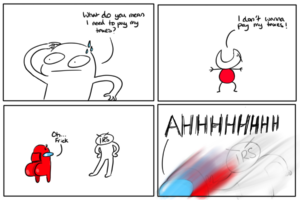
The consensus about this summer’s movies is that they were all sad affairs, with two glorious exceptions: The impossible-to-resist “Toy Story 3” and Christopher Nolan’s mind-bending psychological thriller “Inception.” But Willie Clark, the devoted Editor-in-Chief of the Campus Times, happened to be in the minority of people who thought “Inception” was a flat-out disappointment. This led to an epic “Inception” debate with Jason Silverstein, one half of the A&E editorship. Below is a partial transcription of this duel, which can be heard in its entirety on the Campus Times website. Warning: All kinds of “Inception” spoilers within.
Jason Silverstein: So, what was wrong with “Inception”?
Willie Clark: What wasn’t wrong with “Inception”?
JS: Fuck you.
WC: Great way to get started. Maybe my problem was I went into “Inception” with very high hopes. I walked out of it with two of my friends, and one of them, she was just like, “Wow, I feel like my mind has been torn from my skull and exploded on the ground, and I can’t even think. I don’t want to sleep anymore. I don’t know what’s real.” And I was like, “Meh.”
Besides making the action sequence cool, because people could believably walk on walls and on the ceiling, nothing was really that unnatural. I thought it was a good idea, I just didn’t see it taken to the level I expected a movie based on dreams to be taken to.
JS: So, basically what you’re saying is that, instead of something being particularly wrong with the movie, it just didn’t measure up to your expectations. But what about what the movie actually presented?
WC: I enjoyed the action, for what it was worth. It wasn’t supposed to be the most action-oriented movie, which was fair, but I thought the action was pretty decent. And I wanted to know up
to a point what happened, but just, by the end of the movie, I really didn’t care anymore.
JS: You only saw it once, right?
WC: Yes. I will not see it again.
JS: The consensus is that it’s a movie that has to be seen again. You see it one time, and that’s basically a test run to get that initial idea, and then you go back again and you don’t have to worry so much about following it.
WC: A lot of people have said that. There was nothing in that movie that made me want to see it again or made me feel that if I saw it again I would understand it better. My least favorite part of the movie was how [Christopher Nolan] spent so much time in the first half building up these rules for the dream world, and building up a reality inside this fantasy universe and then in the end everything just went to shit.
Literally, in about a minute of dialogue, they change the rules of how the dream world works. Because they’re using “special sedation” so that means they can’t wake up if they die, and they’ll end up being lost in a limbo world forever. It was complete bullshit!
JS: How was it bullshit?
WC: It did not make sense.
JS: They had to use more sedation because they had to be under sedation for longer!
WC: I don’t know. I thought he was just grasping for straws at how to bend the rules by that point. The ending, we can talk about the ending. I didn’t care if it was all a dream or if he did make it out, either way wasn’t mind-shockingly amazing to me. At no point in the movie did I feel like my sense of reality had been distorted.
JS: But again, that’s expectations. Christopher Nolan spends about 10 years working on this screenplay and it’s one of those movies that’s going to attract viewers from future generations because it’s got this alternate reality with its own rules and logic and everything. He creates this entire thing, and then you’re just mad because it didn’t completely fuck your mind.
WC: He’s wasted 10 years of his life on something I don’t think turned out that well. He’s done very great stuff, and stuff that was better than this, and for something that he spent so long on, the alternate reality isn’t that alternate.
JS: So would you have preferred if instead of each dream level being realistic, it was some kind of abstract type of thing?
WC: I [didn’t expect] it to be fantasy. That is one thing the movie did do well for the most part. For a lot of it, the movie is rooted in believability. Within itself, it seems like it could be true. [But] besides having people run on walls, there wasn’t anything specifically radical, new or creative to what he brought to dreams. I mean, so people can go into dreams, that’s cool, but that’s where he stopped, and I really would have liked to have seen that pursued further.
JS: I think that’s the part people are going to remember. That’s the part that’s going to be ripped off in all the “Inception” rip-offs that are going to be coming out over the next few years. But it’s a perfect screenplay, in that it doesn’t just work on that level. It could have just coasted on that level, but the fact is, Leonardo DiCaprio’s character is actually treated as a character with some kind of depth.
WC: I’m really not a Leonardo DiCaprio fan, [but] the character was done very, very well. And even some of the supporting roles were good. The whole movie rolled on him. If he didn’t work, none of the movie worked.
JS: Put your English major cap on. If [Nolan’s] going to tell this story, where the main point is really [Cobb, Leonardo DiCaprio’s character] getting over his wife’s suicide, why would that be linked to a story about going into people’s dreams and changing thoughts? It’s not just a coincidence, it’s not just a way to drive the plot — really, the whole point of the movie isn’t doing this inception job on this Fisher character.
WC: It’s him going in himself. I was kind of intrigued that he had used inception on his wife, but by the time you learned that, he’d said several times, ‘I’ve used inception once before on someone who’s not in this film currently and there’s only one other person mentioned by name.’ But I thought that was kind of interesting.
JS: So, about the ending. I don’t think it makes a difference that it wasn’t resolved. I think that’s what hung a lot of people up. The fact that the movie didn’t give you the answer, a lot of people were searching for it. Anytime there’s an ambiguous ending, people always think that the proper response is to go decide if it was one way or another.
WC: I don’t think it matters either way, and I think that was his point. His character has reached his consolation or whatever. It wasn’t like [Nolan] ran out of film and decided not to put [a clear answer] in. It doesn’t even matter to the character at the end. He’s got his kids, he’s seen his kids’ faces for the first time in however long it’s been, it doesn’t matter if it’s real or not, it’s real enough at that moment.
JS: Chris Nolan, at least in the past few movies he’s done, he’s mastered this perpetual climax narrative. If you think about “The Dark Knight,” the whole movie is escalating on top of itself. After problems are set in motion, it just keeps getting bigger and bigger.
WC: Do you feel “Inception” worked in that same way?
JS: I think he did a much better job with that style in “Inception.” I mean, I love “The Dark Knight,” but even I have to admit that part of its appeal is because it’s a masterpiece within the context of the superhero movie, and fans were just glad to see characters taken seriously and a plot that was not some campy bullshit.
“Inception” was complete inspiration, on [Nolan’s] part, and he’s doing something completely new. Whether or not it matched your expectations or whatever, you can probably guess this is going to be the movie that is going to be the [definitive] Christopher Nolan movie. And stuff like totems and even the idea of inception, that’s going to enter the pop culture canon. If someone was on the fence about this, would you tell them not to go to “Inception”?
WC: No, I think you have to see it. My original thought was it was either a love-it-or-hate-it, and it seems that it’s more of a, everyone-likes-it-but-me kind of movie.
JS: Alright, that’s your final word?
WC: That’s my final word.
JS: My final word is that no one should see this movie only once. There are some movies that were just made for you to see once and then go back and really see it, and this is one of them, Maybe you should check it out when it comes to Hoyt Auditorium [UR Cinema Group plans to screen “Inception” on Nov. 5].
Rosenberg is a member of the class of 2012.

